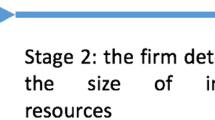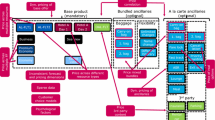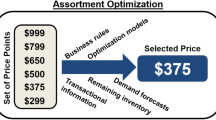Abstract
The pricing of flexible products is a new price discrimination practice that can enable firms to increase revenues under capacity considerations. A flexible product is defined as a good or service with at least one product attribute not fully specified at the time of the purchase, leaving the seller with at least two alternatives for the final product design and the ability to assign consumers to one of these alternatives at a later date. Flexible products enable sellers to better utilized capacity, as well as, to segment consumers and price discriminate according to different levels of flexibility. We empirically analyze consumer purchase behavior for flexible products based on a large field study of a low-cost airline. At this low-cost airline, consumers can select the level of flexibility of the flexible product. We identify the drivers of purchase behavior by analyzing the impact of consumers’ flexibility and search behavior and the price discount of the flexible ticket. Further, we estimate the revenue and profit effects of flexible products.



Similar content being viewed by others
References
Baron RM, Kenny DA (1986) The moderator-mediator variable distinction in social psychological research: conceptual, strategic, and statistical considerations. J Pers Soc Psychol 51(6):1173–1182
Bitran G, Caldentey R (2003) An overview of pricing models for revenue management. Manufact Service Oper Manag 5(3):203–229
Chandran S, Morwitz VG (2005) Effects of participative pricing on consumers’ cognitions and actions: a goal theoretic perspective. J Consum Res 32(2):249–259
Chernev A (2003) Reverse pricing and online price elicitation strategies in consumer choice. J Consum Psychol 13(1&2):51–62
Desiraju R, Shugan SM (1999) Strategic service pricing and yield management. J Mark 63:44–56
Doganis R (1996) Flying off course. Routledge, London
Fay S (2004) Partial repeat bidding in the name-your-own-price channel. Mark Sci 23(3):407–418
Fay S, Xie J (2008) Probabilistic goods: a creative way of selling products and services. Mark Sci 27(4):674–690
Fay S, Xie J (2010) The economics of buyer uncertainty: advance selling vs. probabilistic selling. Mark Sci 29(6):1040–1057
Feick LF, Price LL (1987) The market maven: a diffuser of marketplace information. J Mark 51:83–97
Gallego G, Phillips R (2004) Revenue management of flexible products. Manufact Service Oper Manag 6(4):321–337
Guiltinan JP (1987) The price bundling of services: a normative framework. J Mark 51(2):74–85
Hann I-H, Terwiesch C (2003) Measuring the frictional costs of online transactions: the case of a name-your-own-price channel. Manag Sci 49(11):1563–1579
Kimes SE, Wirtz J (2003) Has revenue management become acceptable? J Service Res 6(2):125–135
McGill JI, Van Ryzin GJ (1999) Revenue management: research overview and prospects. Transport Sci 33(2):233–256
Ng ICL (2006) Differentiation, self-selection and revenue management. J Revenue Price Manag 5(1):2–9
Petrick A, Steinhardt C, Gönsch J, Klein R (2009) Using flexible products to cope with demand uncertainty in revenue management. OR Spectrum 1–28. doi:10.1007/s00291-009-0188-1
Petrick A, Gönsch J, Steinhardt C, Klein R (2010) Dynamic control mechanisms for revenue management with flexible products. Comput Oper Res 37(11):2027–2039
Post D (2010) Variable opaque products in the airline industry: a tool to fill the gaps and increase revenues. J Revenue Price Manag 9:292–299
Shapiro D, Zillante A (2009) Naming your own price mechanisms: revenue gain or drain? J Econ Behav Organ 72(2):725–737
Shugan SM, Xie J (2000) Advance pricing of services and other implications of separating purchase and consumption. J Service Res 2(3):227–239
Shugan SM, Xie J (2005) Advance-selling as a competitive marketing toll. Int J Res Mark 22(3):351–373
Smith BC, Leimkuhler JF, Darrow RM (1992) Yield management in American airlines. Interfaces 22(1):8–31
Sobel J (1984) Nonlinear prices and price-taking behavior. J Econ Behav Organ 5:387–396
Spann M, Tellis GJ (2006) Does the internet promote better consumer decisions? The case of name-your-own-price auctions. J Mark 70(1):65–78
Spann M, Skiera B, Schäfers B (2004) Measuring individual frictional costs and willingness-to-pay via name-your-own-price mechanisms. J Interact Mark 18(4):22–36
Talluri KT, van Ryzin GJ (2004) The theory and practice of revenue management. Kluwer Academic Publishers, Germany
Tellis GJ (1986) Beyond the many faces of price: an integration of pricing strategies. J Mark 50:146–160
Wirtz J, Kimes SE (2007) The moderating role of familiarity in fairness perceptions of revenue management pricing. J Service Res 9(3):229–241
Xie J, Shugan SM (2001) Electronic tickets, smart cards, and online prepayments: when and how to advance sell. Mark Sci 20(3):219–243
Acknowledgments
We gratefully acknowledge helpful feedback from Marc Fischer, as well as the participants of AGIFORS Annual Symposium 2005, Informs Annual Meeting 2007, EMAC 2008 and Informs Marketing Science Conference 2008.
Author information
Authors and Affiliations
Corresponding author
Rights and permissions
About this article
Cite this article
Mang, S., Post, D. & Spann, M. Pricing of flexible products. Rev Manag Sci 6, 361–374 (2012). https://doi.org/10.1007/s11846-011-0075-4
Received:
Accepted:
Published:
Issue Date:
DOI: https://doi.org/10.1007/s11846-011-0075-4




